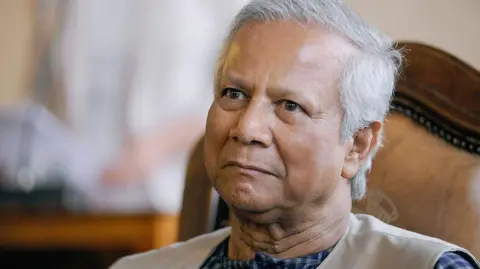 Getty Images
Getty ImagesNobel Peace Prize winner Muhammad Yunus will be the chief adviser of an interim government in Bangladesh, the president’s office has announced.
The decision was made at a meeting between President Mohammed Shahabuddin, military leaders, and the heads of the Students Against Discrimination group, the presidency said.
It comes a day after prime minister Sheikh Hasina was forced from power and fled the country, following weeks of student-led protests that spiralled into deadly unrest.
Student leaders had been clear they would not accept a military-led government and had pushed for Mr Yunus to lead the interim administration.
Mr Yunus, who agreed to take up the role, said: “When the students who sacrificed so much are requesting me to step in at this difficult juncture, how can I refuse?”
He is returning to Dhaka from Paris, where he is undergoing a minor medical procedure, according to his spokesperson.
“The president has asked the people to help ride out the crisis. Quick formation of an interim government is necessary to overcome the crisis,” the president’s office said in a statement.
According to local media, more than 100 people died in violent clashes across Bangladesh on Monday, the single deadliest day since mass demonstrations began.
Hundreds of police stations were also torched, with the Bangladesh Police Service Association (BPSA) declaring a strike “until the security of every member of the police is secure”.
The group sought to place the blame at the door of authorities, saying they were “forced to fire”.
Overall, more than 400 people are believed to have died, as protests were met with harsh repression by government forces.
Bangladesh’s national police chief was sacked on Wednesday, the president’s office said.
The protests began in early July with peaceful demands from university students to abolish quotas in civil service jobs, but snowballed into a broader anti-government movement.
Weeks of unrest culminated in the storming of the prime minister’s official residence, not long after Ms Hasina had fled to neighbouring India, ending nearly 15 years of rule.
Within hours of her resignation, Bangladesh’s army chief Gen Waker-uz-Zaman pledged that an interim administration would be formed, adding on state television that “it is time to stop the violence”.
Ex-prime minister and key opposition leader Khaleda Zia was released from years of house arrest on Tuesday, an earlier presidential statement said.
She chairs the Bangladesh Nationalist Party (BNP), which boycotted elections in 2014 and again in 2024, saying free and fair elections were not possible under Ms Hasina.
The BNP wanted the polls to be held under a neutral caretaker administration. This has now become a possibility after the departure of Ms Hasina, who had always rejected this demand.
Ms Zia, 78, served as prime minister of Bangladesh from 1991 to 1996, but was imprisoned in 2018 for corruption, although she said the charges were politically motivated.
She was not the only opposition figure to be released after years of detention.
Activist Ahmad Bin Quasem was also freed, according to his lawyer Michael Polak.
Rights groups say Mr Quasem was taken away by security forces in 2016, just one of hundreds of forced disappearances in the country under Ms Hasina’s rule.
“There were many points during his detention that he was feared dead, and the uncertainty was one of the many tools of repression utilised by the regime,” Mr Polak explained, adding they hoped the decision to release political prisoners “is a positive sign of their intentions”.
“Unfortunately, the good news won’t be shared by all,” he told the BBC, stating that a number of political prisoners had died in custody.
At least 20 other families of political prisoners gathered outside a military intelligence force building in the capital Dhaka on Tuesday, still desperately waiting for news about their loved ones, AFP news agency reports.
“We need answers,” said Sanjida Islam Tulee, a co-ordinator of Mayer Daak (The Call of the Mothers) campaign group.
Across the border in India, Foreign Minister S Jaishankar said he was “deeply concerned till law and order is visibly restored” in Bangladesh, with which India shares a 4,096-km (2,545-mile) border and has close economic and cultural ties.
He gave the first official confirmation that Ms Hasina made a request to travel to India at “very short notice” and subsequently arrived in Delhi.
India also deployed additional troops along its border with Bangladesh.
“Our border guarding forces have also been instructed to be exceptionally alert in view of this complex situation,” Mr Jaishankar said.

